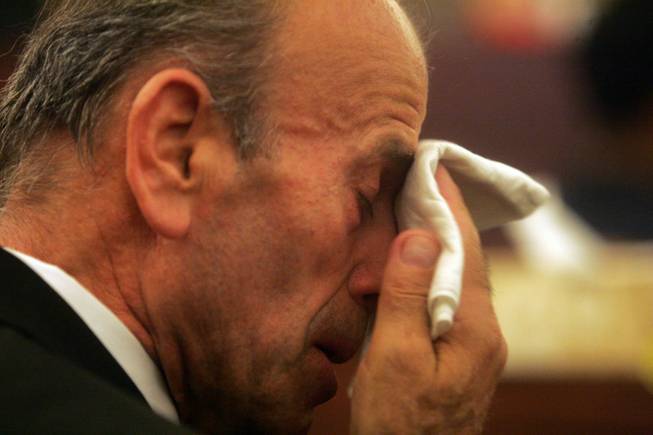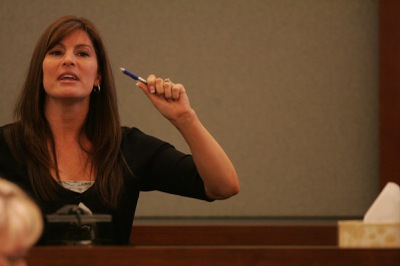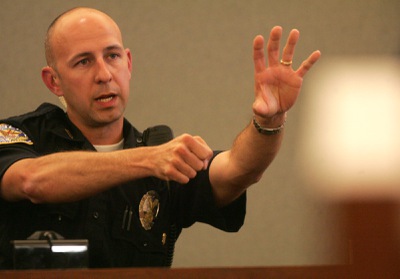
HEATHER CORY / HOME NEWS
Zyber Selimaj dabs his eyes Thursday during the coroner’s inquest into the police killing of his wife, ice cream truck driver Deshira Selimaj, on Feb. 12.
Friday, April 11, 2008 | 2 a.m.
Sun Topics
Arber Selimaj didn’t know how to spell his last name, and whispered most of his answers to a woman who, in a private room of a Henderson Police station, asked the 5-year-old boy what he remembered from the day he watched his mother die, and whether she had a knife — another word Arber didn’t know.
What he called the knife sounded like “seeka.” Perhaps, given that his parents speak Albanian, he used the Albanian word for knife, “thikë.”
At the end of Day One of the coroner’s inquest into the death of Deshira Selimaj, the Henderson ice cream truck driver shot by police on Feb. 12, it was this half-whispered testimony that stood out as the most haunting, and the most controversial.
Police interviewed Arber Selimaj and his 11-year-old brother, Alban, hours after both boys watched their mother shot by Henderson Police Officer Luke Morrison. The police didn’t ask their father, Zyber, who had been incarcerated after the shooting, for permission to interview the children. As prosecutor Christopher Lalli explained it, the police didn’t have to.
Jim Jimmerson, an attorney for the Selimaj family, objected even though, technically, he had no standing in the inquest to object. He called the police interviews of the Selimaj children “the worst of all ambushes.”
So Jimmerson and Deshira’s family members heard Arber and Alban interviewed by police for the first time, over a loudspeaker, in court. It was one of several firsts in the afternoon’s testimony, which came from the two boys, their father, three police officers and three passers-by — Terry Tibbs, Melanie Nelson and Ian Campo.
The other “firsts” came in the form of information, details revealed for the first time in court by police officers admonished to keep quiet until the inquest. Some of the more notable information:
• Two people decided to shoot Deshira Selimaj at the same time — Morrison with his firearm, and an officer who used a Taser.
• Deshira had knives in her ice cream truck, despite her husband’s insistence otherwise. The knives were in an empty Skittles bulk-sized candy box, one clearly identifiable as something along the lines of a kitchen knife, and the others somewhat obscured by other items.
• A Taser initially fired at Deshira by Officer Anthony Pecorella did not work because one Taser prong did not connect with the 42-year-old mother’s body.
• Officer Patrick Gilmore, the traffic cop who first pulled over Zyber Selimaj, told the jury that officers are trained to always fire two shots. In this case, however, only one gunshot was fired.
The entire afternoon was dominated by discussion of the knife — whether Deshira had one, and what she did with it. Gilmore testified that because a knife is a deadly weapon, police must respond with a deadlier weapon — a gun.
For Joe and Jane Citizen, who have been critical of the case, that logic doesn’t always compute, and jurors appeared to ask questions to the effect of: Was the use of a gun a necessary response to a kitchen knife, especially when the knife was being held by one relatively small woman who was surrounded by policemen?
Testimony from the children had been recorded the afternoon of the shooting and was played aloud for the jury, which strained to hear the audio recording of younger Arber and the video recording of older Alban, who cried when he described how his mother threatened to kill herself when she confronted Henderson Police.
He also cried when he was asking where his mother was, and what hospital she had been taken to. It appeared he was unaware she had died.
Henderson Officer Jeremy Lovell testified that police normally ask parents for permission to do an interview with such a young minor. Gary Peck, executive director of the American Civil Liberties Union of Nevada, was outraged to learn that, this time, police did not ask.
Peck was not the only one who was outraged. On one side of the courtroom, friends and relatives of the Selimaj family — Albanian men in suits, sweatshirts, gold chains — spent much of the afternoon with their arms clasped tightly across their chests, leaning over to whisper to one another and shake their heads.
On the other side of the room, the police and their law enforcement entourage were collected and calm, relaxed in the certainty that Morrison, and their department, were in the right.
Officer Jeffrey Wiener testified that Deshira Selimaj had come out of her ice cream truck yelling profanities and threatening to kill the officers. Later, she threatened to kill herself and her children, Wiener said. He said at one point he was prepared to shoot her in the head because he thought she might try to kill her son. He also said he nearly shot her a second time, a split second before Morrison shot her and another officer simultaneously shocked her with a Taser.
Wiener said an officer put his foot on Deshira’s back to hold her because she was still struggling after she had been shot and shocked.
Henderson Police Chief Richard Perkins said he looked forward to media coverage after Morrison is cleared.
There are still more than 20 witnesses slated to testify, however, before Perkins does, or doesn’t, see his officer cleared.
Of all the afternoon’s testimony, father Zyber Selimaj’s was the most strained, filtered through jags of half-crying and an Albanian interpreter whom Selimaj couldn’t help but interrupt with an occasional answer in English.
When Lalli, the prosecutor, started questioning Selimaj about his wife, and whether she had a knife when she was shot, the Albanian father’s attorney cut across the courtroom floor to deliver him a tissue.
This distraught Selimaj seemed to echo the man Gilmore described when recounting the ice cream man’s reaction to being pulled over for traffic violations. Selimaj was so emotional at the prospect of getting a ticket that in between his sobbing he said he might as well kill himself, Gilmore reported. It was that kind of statement that prompted Gilmore, Wiener and their fellow officer Alan Olvera, a trainee, to decide Selimaj should be taken to the hospital for a “Legal 2000” — a 72-hour hold for people deemed mentally ill.
Though the officers could have taken Selimaj in a police car to the hospital, they didn’t want to, Gilmore said, because department policy would require handcuffing the distressed father. Instead, the officers called for an ambulance, only to learn it would take an hour to arrive at the scene. They made Selimaj wait, sitting on the ground and crying, and said nothing to him until Deshira arrived.
If Selimaj was distraught enough to be taken to the hospital before the shooting, he certainly was emotional enough afterward. But police changed their minds about the Legal 2000 and took the father to jail, in handcuffs, in a police car, on obstruction charges instead.
Selimaj says he was never told he needed to go to the doctor. He also told the jury that police asked whether they could get a recorded statement from him at the scene, in a police car. Selimaj refused.
Out in the hallway, his Albanian relatives asked person after person, through the interpreter hired by the court, whether it was OK in America for police to interview children without a parent’s permission. No one knew.



Join the Discussion:
Check this out for a full explanation of our conversion to the LiveFyre commenting system and instructions on how to sign up for an account.
Full comments policy